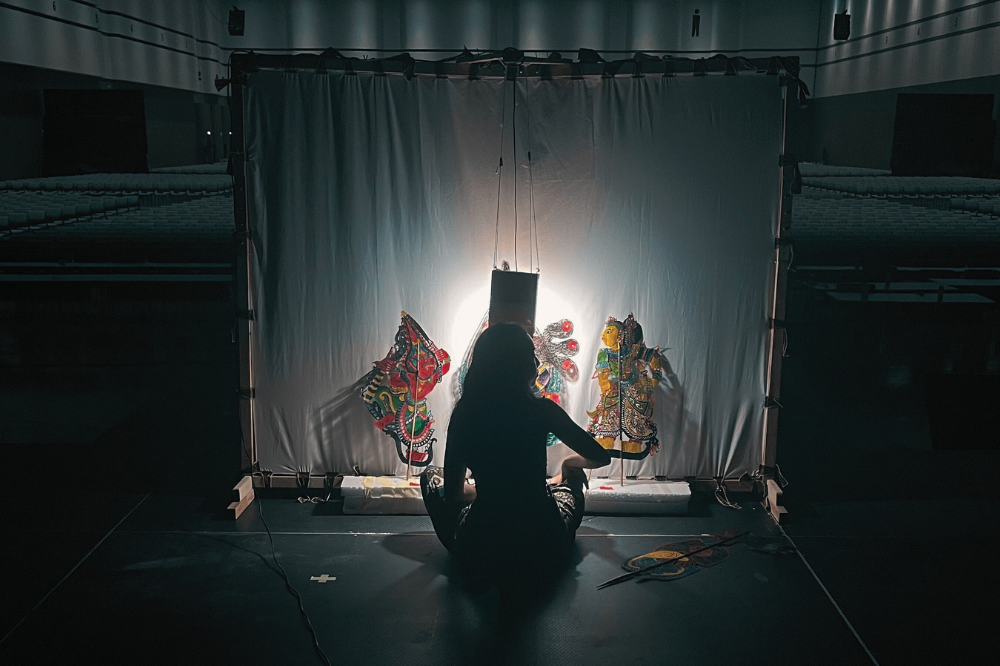In the shadowy glow of an oil lamp, intricately crafted puppets dance across a screen, bringing to life ancient tales of heroism, trickery, and moral dilemmas. This is Wayang Kulit, the traditional Southeast Asian shadow puppet theatre that has captivated audiences for centuries.
But behind the screen of one particular performance stands Illya Sumanto, a Malaysian artist and educator, challenging norms in a field long dominated by men. Illya’s journey into Wayang Kulit began not to challenge tradition, but to explore an art form steeped in cultural richness.
"Traditionally, wayang kulit has been shaped by male voices. Female characters are often sidekicks or supporting figures. I wanted to explore how this art form could be enriched with female perspectives,” she shared.
Her passion for this centuries-old craft took her to Kelantan, the heartland of Malaysian Wayang Kulit, where she trained under master puppeteer Pak Dain and his wife, Kak Timah. Both mentors, deeply rooted in the art form, recognised Illya’s vision and supported her idea of creating an all-female wayang kulit troupe.
"Pak Dain and Kak Timah were incredibly supportive. They understood that art thrives and evolves when it opens up to new voices," she said.
While Illya received encouragement from her mentors, the journey wasn’t without challenges. Traveling alone from Chiang Mai to Kelantan for rehearsals, often as the only woman in the room, was daunting.
"I felt nervous being in a space that’s so male-dominated,” she said. But her determination won over her peers, and as they saw her dedication, their respect and acceptance followed.
One particular challenge was adapting to the physical demands of manipulating the puppets while narrating in a male character’s voice—a staple of Wayang Kulit performances. Instead of trying to fit into traditional molds, Illya carved her path, creating female characters with voices and stories that felt authentic to her.
"This allowed me to bring more of myself into the art form while respecting its traditions,” she said.
Illya’s boldest move was forming an all-female wayang kulit troupe, a groundbreaking initiative that has drawn collaborators from across Southeast Asia and beyond.
On Dec 2 this month, this diverse group performed at the International Women’s Forum in Bangkok, organised by the Association for Women’s Rights in Development (AWID). The event, attended by over 3,500 delegates worldwide, was a landmark moment for the troupe and the art form.
The performers included Annabel Laura, of Indonesian-Dutch heritage; Tigra Rose from Indonesia; Victoria Yam, a Cambodian-Malaysian; and Olamide from Thailand. The supporting crew was equally impressive, featuring Lynn Nandar Htoo, Sarah Amer, Sophie Decker, puppet designer Mali, fire dancer Mint, and art director Amanda Gayle.
Their performance captivated the audience, blending traditional narratives with modern themes and showcasing the unique energy that emerges when women unite their artistic voices.
"When women come together, there’s a unique energy that emerges from our shared experiences. Our struggles, achievements, and perspectives add depth to the stories we tell,” Illya said.
The troupe’s performances have received widespread acclaim, particularly from female audiences.
"When I performed in front of my female Kelantanese Chinese friends recently, they were incredibly inspired. It’s rewarding to see women resonate with the stories and feel empowered to explore traditional arts themselves," she said.
Illya believes that her presence in Wayang Kulit is helping to reshape public perceptions of the art form.
"By creating female-led productions, we’re broadening its emotional range and making it accessible to young women and girls. I want them to know that Wayang Kulit is for them too—that they can be storytellers and cultural keepers,” she added.
Beyond Malaysia, Illya’s work has introduced global audiences to the richness of Southeast Asian culture. For her, Wayang Kulit is not just an art form but a vessel for history, emotion, and universal human stories.
"Within Malaysia, I want it to gain more recognition as an essential part of our national identity. And on the global stage, I hope it continues to thrive as a form of cultural exchange,” she said.
As more women like Illya step into the spotlight, they are not only preserving Wayang Kulit but also challenging it to grow. Their voices, perspectives, and innovations breathe new life into this ancient art, ensuring that it remains vibrant for generations to come.
"Art thrives when it opens up to new ideas. And through this evolution, I hope to inspire others to embrace and celebrate their cultural heritage in fresh, meaningful ways," she said.


